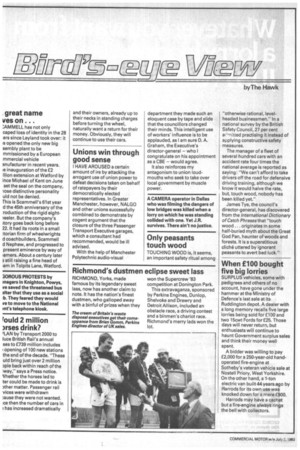by The Hawk
Page 38

If you've noticed an error in this article please click here to report it so we can fix it.
. great name ves on .
:AMMELL has not only caped loss of identity in the 28 ars since Leyland took over: it s opened the only new big sembly plant to be mmissioned by a European mmercial vehicle 3nufacturer in recent years. le inauguration of the £2 Ilion extension at Watford by ince Michael of Kent on June set the seal on the company, lose distinctive personality uld not be denied. This is Scammell's 61st year d the 45th anniversary of the roduction of the rigid eightieeler. But the company's ;tory goes back long before 22. It had its roots in a small Aorian firm of wheelwrights d coachbuilders, Scam mell d Nephew, and progressed to present eminence by way of ;amers. About a century later still raising a fine head of ;arn in Tolpits Lane, Watford.
30ROUS PROTESTS by :nagers in Knighton, Powys, ve saved the threatened bus alter that they use as a social b. They feared they would ve to move to the National bnt's telephone kiosk.
fould 2 million )rses drink?
'LAN by Transport 2000 to luce British Rail's annual ses to £739 million includes ; opening of 100 new stations the end of the decade. "These uld bring just over 2 million Dple back within reach of the way," says a Press notice. Vhether the horses led to ter could be made to drink is )ther matter. Passenger rail vices were withdrawn
;ause they were not wanted. ce then the number of cars in has increased dramatically
and their owners, already up to their necks in standing charges before turning the wheel, naturally want a return for their money. Obviously, they will continue to use their cars.
Unions win through good sense
HAVE AROUSED a certain amount of ire by attacking the arrogant use of union power to defeat decisions taken on behalf of ratepayers by their democratically elected representatives. In Greater Manchester, however, NALGO and other unions successfully combined to demonstrate by cogent argument that the closure of the three Passenger Transport Executive garages, which a consultant had recommended, would be ill advised.
With the help of Manchester Polytechnic audio-visual
department they made such an eloquent case by tape and slide that the councillors changed their minds. This intelligent use of workers' influence is to be applauded, as I am sure D. A. Graham, the Executive's director-general — who I congratulate on his appointment as a CBE — would agree. It also reinforces my antagonism to union loudmouths who seek to take over local government by muscle power.
A CAMERA operator in Dallas who was filming the dangers of low bridges was killed when a lorry on which he was standing collided with one. Yet J.R. survives. There ain't no justice.
Only peasants touch wood
TOUCHING WOOD is, it seems, an important safety ritual among "otherwise rational, levelheaded businessmen." In a national survey by the British Safety Council, 27 per cent emitted practising it instead of applying constructive safety measures. The manager of a fleet of several hundred cars with an accident rate four times the national average is reported as saying: "We can't afford to take drivers off the road for defensive driving training, although we know it would halve the rate, but, touch wood, nobody has been killed yet." James Tye, the council's director-general, has discovered from the International Dictionary of Catch Phrases that "touch wood ... originates in some half-buried myth about the Great God Pan, haunter of woods and forests. It is a superstitious cliché uttered by ignorant peasants to avert bad luck."
When £100 bought five big lorries
SURPLUS vehicles, some with pedigrees and others of no account, have gone under the hammer at the Ministry of Defence's last sale at its Ruddington depot. A dealer with a long memory recalls five large lorries being sold for £100 and two 15cwt Fords for £25. Those days will never return, but enthusiasts will continue to haunt Government surplus sales and think their money well spent. A bidder was willing to pay £2,000 for a 250-year-old handoperated fire-engine at Sotheby's veteran vehicle sale at Nostell Priory, West Yorkshire. On the other hand, a 1-ton electric van built 44 years ago by Harrods for its own use was knocked down for a mere £900. Harrods may have a cachet but a fire-engine always rings the bell with collectors.




































































































